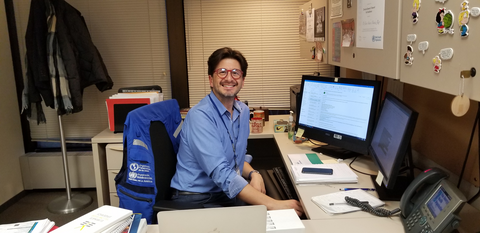PAHO/WHO Collaborating Centre Spotlight Series
Reference Number: MEX-32
Official Title: PAHO/WHO CC for Arboviruses
Institution: Laboratorio de Arbovirus y Virus Hemorrágicos, Departamento of Virología, Instituto de Diagnóstico y Referencia Epidemiológicos (InDRE), Secretaria de Salud
Reference Number: USA-126
Official Title: PAHO/WHO CC for WHO CC for Smallpox and Other Poxvirus Infections
Institution: National Center for Emerging and Zoonotic Infectious Diseases, Poxvirus and Rabies Branch, Division of High Consequence Pathogens and Pathology, Centers for Disease Control and Prevention (CDC)
Reference Number: USA-354
Official Title: PAHO/WHO CC for Arthropod-Borne Viruses Reference and Research
Institution: National Center for Emerging and Zoonotic Infectious Diseases, Division of Vector-Borne Diseases, Arboviral Diseases Branch, Centers for Disease Control and Prevention (CDC)
Reference Number: ARG-19
Official Title: PAHO/WHO CC for Reference and Research of Arbovirus and Hemorrhagic Fevers Virosis
Institution: Instituto Nacional de Enfermedades Virales Humanas (INEVH)
Reference Number: USA-147
Official Title: PAHO/WHO CC for Studies on the Ecology of Influenza in Animals
Institution: Department of Virology & Molecular Biology, St. Jude Children’s Research Hospital, University of Tennessee
Reference Number: USA-118
Official Title: PAHO/WHO CC for Surveillance, Epidemiology and Control of Influenza
Institution: Influenza Division, National Center for Immunization and Other Respiratory Diseases, Centers for Disease Control and Prevention (CDC)
Category 5 (SP 14-19)
Outcome 24 (SP 20-25)
Dr. Jairo Mendez Rico, Advisor, Viral Diseases, is the PAHO staff member who acts as the Region’s focal point and also has a supporting role to the WHO focal point, to coordinate the collaboration between the institution and the Organization.
The main activities of these Centres include: (1) characterizing and genotyping viruses; (2) conducting trainings for the detection of viruses; (3) writing publications and guidelines; (4) validating serological kits; and (5) testing diagnostic algorithms and deploying personnel to outbreaks.
The Centre at InDRE is the reference center for arboviruses in the Region and focuses on genotyping arboviruses, particularly, dengue virus Type 2 and is currently leading a project (expected in 2020) focused on the immune response to zika virus and dengue. The Centre partnered with Vigilancia Genómica del Dengue en las Américas and CDC Puerto Rico, to publish the validation of arbovirus serological kits, a report that can now be used to recommend what kits are beneficial for Member States in the Region. Additionally, the Centre hosts training in Nicaragua for the detection of viruses in mosquitoes and is collaborating with PAHO to adapt several Quality Management courses on Arboviruses. Currently, Dr. Mendez and the Centre are planning a training course in serology detection for diagnosis in yellow fever (March 2020), targeted to 13 endemic Member States in the Region.
The Centre at the National Center for Immunization and Other Respiratory Diseases, CDC, has received and processed more than 6,000 samples from all the National Influenza Centers (NICs) since its designation. These samples have been molecular and phenotypically characterized in order to recommend to WHO, the best vaccine candidates. The Centre also provides updates and tools available through the CDC Laboratory Support for Influenza Surveillance (CLSIS) SharePoint Site. In terms of research, the Centre supported ongoing projects related to influenza bioinformatics and Burden of Disease studies. Lastly, with PAHO, CDC has provided trainings for different topics, including molecular diagnosis and interpretation (Mexico, September 2018) and Bioinformatics (Washington D.C., 2017).
The Centre at INEVH has provided reagents and material to Nicaragua and Bolivia for serology and molecular detection of Hantaviruses and Arenaviruses. For example, during August 2019, INEVH responded to an Arenavirus outbreak by deploying staff to Santa Cruz, Bolivia to support the implementation of laboratory diagnosis and to study the ecology and reservoirs of the arenavirus. With respect to training, in 2018, the Centre conducted the training of Viral isolation and cell culture in Pergamino, Argentina, with participants from eight Member States in the Region.
The Centre at the Arboviral Diseases Branch at CDC has together with PAHO, conducted several face-to-face trainings for chikungunya virus diagnosis (Nicaragua, 2015), regional training for zika virus diagnosis (Brazil, 2016) and yellow fever serology training (USA, 2018). The Centre played a key role during the last three largest outbreaks in the Region for chikungunya, zika and yellow fever by deploying at least six different staff to PAHO-led missions in the field and provided diagnosis protocols, critical reagents and material to implement serology and molecular diagnosis in at least 20 countries throughout the Region.
Currently, the Centre at the Poxvirus and Rabies Branch at CDC and the Centre at St. Jude Children’s Research Hospital have no deliverables to report on within the Region as its efforts are focused on activities within the United States.
Webnotes such as these serve to inform how Collaborating Centres are contributing to the Organization’s priorities and mandates.


